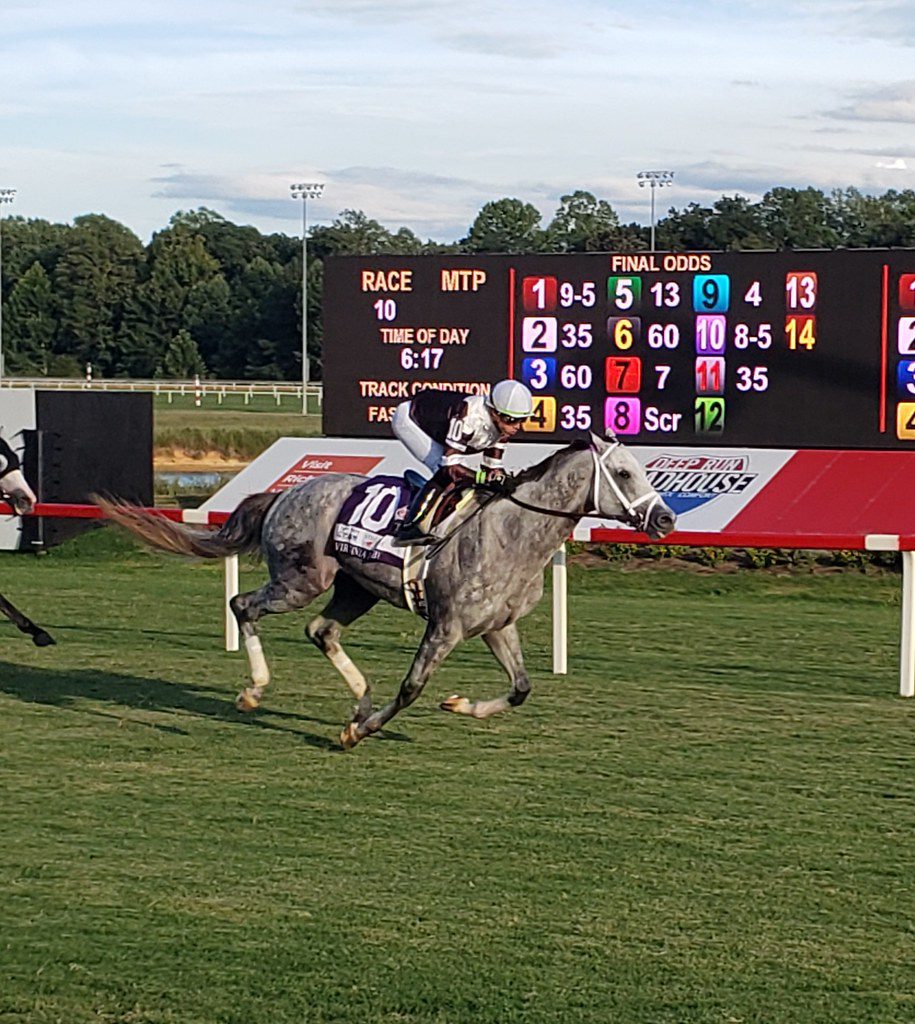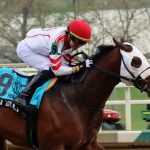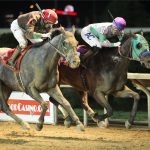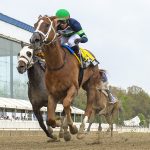Colonial Downs-Arlington Park connection lives on
There was a time when Colonial Downs had a presence at Arlington Park on its signature day. Now, after a little over a decade, it’s just the opposite. Horse racing can relatively change quickly.
In the heyday of the Grand Slam of Grass, horses that won at Colonial Downs early to mid-summer sometimes headed to Chicago seeking late summer glory with aspirations towards the Breeder’s Cup.
Colonial Downs caught three-year-old turf lightning when it elevated the Virginia Derby purse. Originally held in the fall with a modest purse, the 1 ¼-mile Virginia Derby grew quickly when its purse was raised to $500,000 in 2002. After Peter Vegso won repeatedly in the Virginia Derby – that year with Orchard Park and the next with Silver Tree – owner Ken Ramsey brought Kitten’s Joy to New Kent in 2004 to run what Ramsey considers the best race of his career.
With those early successes, then-general manager of Colonial Downs, Iain Woolnough, was inspired to add a partner race, the mile-and-three-sixteenths Colonial Turf Cup, and develop a turf Triple Crown-like series of races tied to the Secretariat Stakes at Arlington Park.
Throw in the Breeders’ Cup Turf and you have the Grand Slam of Grass – one very-hard-to-win racing prize: four races at three different venues, three restricted to three-year-olds and one open to all comers. Oh, and including a multi-million-dollar bonus for sweeping the quartet.
The new series brought a little of everything and brought horses from Colonial Downs to Arlington Park in late summer.
In its first year, English Channel brought instantaneous life in the venture. After an easy win in the Colonial Turf Cup debut, nearly a month later English Channel won the $750,000 Virginia Derby impressively and the Grand Slam was live. Owner James Scatuorchio slapped high fives to strangers on his way down to the winner’s circle while waiting for jockey John Velazquez to return aboard English Channel. With trainer Todd Pletcher’s concurrence, racetrackers in Virginia suddenly had a rooting interest in Arlington’s Secretariat Stakes.
CHECK OUT THE LATEST OFF TO THE RACES RADIO!
Media, track officials, and fans left Colonial Downs in July and went to Arlington Park in August to watch English Channel take the lead in the Secretariat Stakes only to falter to Gun Salute and finish second. Later in the year, English Channel would be the highest American finisher in the Breeder’s Cup Turf, finishing fourth, and suddenly the series had plausibility.
The following year, trainer Barclay Tagg brought the series down to earth, a little bit at any rate. Before smiling for Turf Cup victor Showing Up’s win photo, Tagg announced that he would pass on the Virginia Derby, the three-week timetable not long enough.
He might have questioned his decision in August when Showing Up won the Secretariat Stakes over a field that included Virginia Derby winner Go Between (6th), who had been third in the Colonial Turf Cup. With the bonus no longer being on the line, Showing Up passed on the Breeder’s Cup and won the Hollywood Derby and Jamaica (now the Belmont Derby) to close out his sophomore year.
In 2009, owner Mike House brought Battle of Hastings from the West Coast to Colonial Downs and won Colonial’s two Grand Slam legs by the slimmest of margins, both times over Alan Goldberg’s Straight Story. But House and trainer Jeff Mullins passed on the Arlington leg of the series and ran second in the Del Mar Derby in September. It would turn out that the Colonial legs were the best races of his career.
Nobody knew, as Battle of Hastings completed his Colonial sweep, that the Grand Slam of Grass would soon be defunct. An economic downturn, a dwindling of the number of racings days, and pari-mutuel handle falling short of purse demand would eventually lead Colonial Downs to withdraw the challenge and eventually lead to its closure after the 2013 season.
A final irony: In 2010 jockey Kent Desormeaux and Paddy O’Prado delivered the Colonial wins in impressive style for trainer Dale Romans and owner Jerry Crawford of Donegal Racing. When Paddy O’Prado won the Secretariat Stakes over a six-horse field at Arlington Park, the colt was very much alive; unfortunately, the series challenge wasn’t. Paddy O’Prado went back to the dirt in the Breeder’s Cup Classic, and in a 12-horse field finished a respectable fifth at Churchill Downs, where he had run third in the Kentucky Derby that spring.

In a short span, those three horses captured Colonial’s “twin turf” races and built a bridge from New Kent to Arlington Heights. The connection between the two tracks made for an exciting three-year-old turf trail.
In 2011, the Colonial Turf Cup was opened to older horses in hopes of bringing back past twin turf competitors, but by 2013, Colonial was closed altogether.
Meanwhile, Arlington Park continued on with the Secretariat Stakes remaining a late summer turf highlight, though the purse toggled between $400,000 and $500,000 for the next decade. As Colonial Downs re-emerged in 2019, the future of Arlington Park became doubtful. As Colonial Downs took flight, Arlington Park went into a tailspin.
And oddly enough, the company that owned Arlington, Churchill Downs, Inc., last year acquired Colonial, praising the business model adopted in Virginia as one that would enable racing to thrive.
Restoring the significance of Colonial Downs in three-year-old turf racing is now on the upswing thanks to the legacy of Arlington Park. With the Secretariat Stakes now on Colonial’s stakes schedule, to go along with the Virginia Derby on September 9, the “twin turf” is back on the menu.
And the Arlington Million provides what the Colonial Turf Cup couldn’t: an opportunity for three-year old excellence to come back to Colonial to compete as older horses.
On August 12, Colonial will for the first time host the Secretariat and Arlington Million, taking a big step in the shoes that belonged to Arlington Park.
Through the stakes races that survived the demolition of where it was held, Arlington Park and Colonial Downs have become linked again for the foreseeable future. Like the Triple Crown, design has had little to do with it. Tied together by a Virginia horse that became the greatest to run in the Triple Crown, another series never designed, Colonial hopes to succeed on Arlington’s tough act to follow.
By destiny perhaps, the Secretariat Stakes should have always been held in the state where Secretariat was foaled. It’s not coming home exactly, but it’s not going away, either. Although Secretariat was born in Virginia, the legacy to his stakes race born at Arlington should never be uncoupled.
LATEST NEWS













